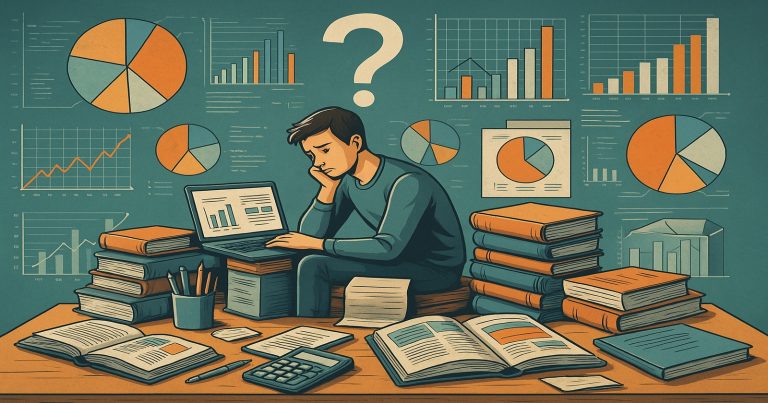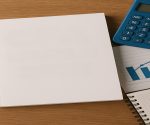Many students ask one common question: Is CPA tough? The CPA exam is challenging but not impossible. It becomes hard due to its huge syllabus, strict exam pattern, and deep concept testing. Every section requires a clear understanding and quick thinking. Still, with the right plan and enough practice, any student can pass the CPA exam. This article explains why the CPA exam is difficult, what the pass rates say, and how students can overcome these challenges. It also compares CPA with other exams and gives smart tips to study better. Read on to learn the truth behind the CPA exam difficulty.
Why is CPA Exam Considered So Difficult?
The CPA exam is challenging for many reasons. Students face a wide syllabus, tricky questions, and a strict time limit. Most have prepared for months, but still feel unprepared on exam day. This section discusses the different things that make the CPA exam difficult for many people.
1. Large Syllabus with Four Exam Sections
The CPA exam has four papers—FAR, REG, AUD, and BEC. Each one covers many topics that take time to understand and learn.
- FAR (Financial Accounting and Reporting) is the most extended and detailed section. It covers many accounting rules, government reports, and financial statements.
- REG (Regulation) mixes tax laws with business law. Students must know the US tax system, ethics, and legal rules.
- AUD (Auditing and Attestation) checks a student’s knowledge of audit work and how to judge risk and students.
- BEC (Business Environment and Concepts) combines business ideas, economics, and written tasks.
Understanding all four papers takes effort. That’s why people say how hard is CPA depends on how well you know these subjects.
2. Tough and Time-Bound Questions
Each CPA section gives 4 hours to finish. But the questions are not easy. They include:
- Multiple Choice Questions (MCQs) that test memory and logic.
- Task-Based Simulations (TBSs) that ask for real-life problem solving.
- Written Communication Tasks (in BEC) that check writing skills.
Students must think fast and stay calm. If you waste time, you leave questions unanswered. The CPA exam difficulty is also about time pressure and the smart way to answer questions.
3. Dynamic Testing Format
The CPA exam uses something called a multi-stage adaptive format. This means:
- If you do well in the first part, the next questions become harder.
- If you do poorly, the next part follows more easily, but gives fewer marks.
This makes the exam tricky. Students can’t guess how tough their paper will be. This adaptive system is one big reason why is CPA hard.
Is CPA Tough? Here’s What You Need to Know
Many students feel nervous before the CPA exam. They don’t just worry about the content. They worry about long-standing fears, fear of failure, and pressure from family or work. This part explains what you must know about the exam and why it feels hard.
1. CPA Exam Needs Concept Understanding
The CPA exam does not want you just to memorize facts. It wants you to apply your knowledge in real cases.
- Questions test if you understand the logic behind accounting steps.
- You have to solve problems and show calculations clearly.
- In some parts, you must type short essays to explain ideas.
You can’t just “study hard”; you must “study smart.” Many students can’t think how hard the” CPA exam? Is. The answer is—it becomes hard when you focus only on theory and forget how to apply it.
2. Long Preparation Time Causes Stress
Most students need at least 12–18 months to complete all sections. They must study while managing jobs or college. Over time, they feel tired and lose focus.
- Some wake up early before work to study.
- Some study late at night and skip breaks.
- Many feel burned out or lose motivation midway.
The hardest part of the CPA exam is not the topics. It’s staying strong and balanced over such a long time.
3. If Discipline is Important
To pass the CPA exam, students must stick to their plan. Missing even one week can push everything behind.
- You need to study almost 300–500 hours per section.
- That means 2–3 hours every day, without fail.
- Regular revision, mock tests, and solving questions are a must.
Students who ask how to crack the CPA exam must focus on time-blocking, short daily goals, and regular testing. Without self-control, even bright students fail.
4. CPA vs CA Difficulty
Some students also compare CPA vs CA difficulty. The CA exam in countries like India is long and has very low pass rates. But CPA is also hard because:
- It tests you with real-world questions.
- It uses time-based simulations.
- It follows international standards.
People say is CPA harder than CA? Yes, in terms of application and exam pressure, CPA feels harder. But CA needs more years to complete.
CPA Pass Rates: What the Numbers Say?
The pass rate of an exam shows how hard it is. In the CPA exam, many people fail on their first try. This section examines CPA exam results and failure rates and determines the most challenging section.
1. CPA Exam Pass Rate 2025
Look at the average cpa exam pass rate for each section in 2025.
| CPA Section | Pass Rate |
| AUD | 49.2% |
| FAR | 44.8% |
| REG | 50.5% |
| BEC | 58.1% |
Only about half the students pass each section. FAR has the lowest success rate. That is why it is often called the hardest.
2. High CPA Exam Failure Rate
The cpa exam failure rate is around 50% for each section. This means many students must retake at least one paper. The reasons are:
- Not studying enough.
- Underestimating simulation questions.
- Getting nervous on the exam day.
This also makes students ask how many people pass the CPA on the first try, but very few do. But with thoughtful planning, even average students can clear it.
3. Which CPA Exam Is Hardest?
Among the four papers:
- FAR is the hardest due to its large syllabus and many topics.
- AUD is tricky as the question is extensive and not direct.
- REG has complex tax laws and business rules.
- BEC is the easiest but has a writing task.
So, when someone asks which CPA exam is most challenging, the answer is FAR, followed by AUD.
Tips to Make the CPA Exam Less Intimidating
The CPA exam may feel scary, but with the right plan, it becomes easier. This section gives tips and tricks to help students study better and stay confident. Anyone who wants to know how to pass the CPA exam will find this helpful.
1. Know How Long to Study for CPA
Students must know how long to study for the CPA. This helps them plan better. The average time is:
- 300–400 hours per section.
- At least 3 months for each paper.
- 12–18 months for all 4 sections.
Break your study into small daily goals. This makes it less scary and easier to manage.
2. Create a Strong Study Plan
A good study plan includes:
- Daily reading time.
- Practice tests every week.
- One full mock test every month.
The study plan should be flexible. If one topic is complex, take more time. Students who ask how to crack the CPA exam must follow this schedule.
3. Use Good Study Material and Coaching
Some students need help from teachers or coaching centers. Others use online courses or video lessons.
- Use books from trusted sources.
- Join student forums to clear doubts.
- Watch videos for complex topics.
The key is regular learning. Innovative tools make complex topics easy. That’s why students ask if it is hard to clear the CPA. The answer is that if you study using the correct method,
4. Follow CPA Exam Tips to Stay Calm
Here are some useful cpa exam tips:
- Sleep well before the exam.
- Revise helpful notes often.
- Practice with the real exam pattern.
Also, take care of your health. Drink water, eat healthy food, and don’t study all night. A fresh mind works better.
How to Study for the CPA Exam?
The CPA exam takes time and planning. Many students ask how to study for the CPA exam because the syllabus is big and confusing. A smart study plan helps manage time, stay focused, and avoid distractions. This section offers simple, detailed strategies to study for each paper, manage stress, and keep your goals in view. It also shows how knowing how much to study for CPA helps you stay on track.
1. Create a Weekly Study Calendar
A weekly plan breaks the big syllabus into small, clear tasks.
- Spend 2–3 hours daily on weekdays and 4–5 on weekends.
- Divide each week into reading, revising, and practice sessions.
- Use Sundays to revise or take a mock test.
A study calendar helps you avoid missing topics. It also tells you how long to study for CPA, which is about 300–500 hours per section.
2. Use the Righterials
Good books and practice tests are essential for success. Don’t try to read everything; focus on a trusted CPA. Don’t try to read everything; focus on trusted CPA. Don’t try to read everything; focus on a trusted CPA.
- Choose one book per section and read it thoroughly.
- Watch concept videos to understand complex topics.
- Use flashcards for formulas and key terms.
Learning how to pass CPA exam becomes easy when you have the right tools. Don’t keep switching materials, or you’ll get confused.
3. Practice Simulations and Mock Tests
Students struggle with task-based simulations (TBSs). To crack these:
- Solve 2–3 simulations every day.
- Focus on difficult areas like FAR (for calculations) and REG (for tax rules).
- Practice complete mock exams under timed conditions once a month.
This improves speed and confidence. It also teaches how to crack CPA exam without fear. Practicing under pressure gets your mind ready for the real test.
4. Track Progress and Adjust Plan
If one topic takes too much time, adjust your schedule.
- Keep a tracker with all topics and mark your progress.
- Do weekly reviews to check weak areas.
- Study more for difficult papers like FAR and AUD.
This is how to study for CPA exam in a flexible but focused way. Tracking progress keeps me motivated and less anxious for the CPA exams.
5. Avoid Burnout and Stay Positive
Studying for CPA is not a race. Avoid overloading your brain.
- Take short breaks every 45 minutes.
- Sleep for 7–8 hours daily.
- Exercise and eat well.
Even if you fail once, it’s okay. Many successful CPAs fail on their first try. Learn from mistakes and move ahead. People often ask if it is hard to clear the CPA, but staying positive makes all the difference.
Is CPA Tough FAQs
Q1: How difficult is CPA?
CPA is challenging but manageable with proper planning. The most complex parts are FAR and simulations.
Q2: What is the hardest part of the CPA?
FAR and REG are difficult due to deep concepts and simulation-heavy pattern.
Q3: Does the CPA exam get harder?
Yes, the exam is patterned on your performance—if you do well, the next testlets will get harder.
Q4: How stressful is CPA?
It can be stressful due to pressure, long prep time, and cost, but support systems help reduce that.
Q5: How many students fail CPA on the first attempt?
Nearly 50% of students fail at least one section on their first attempt.


